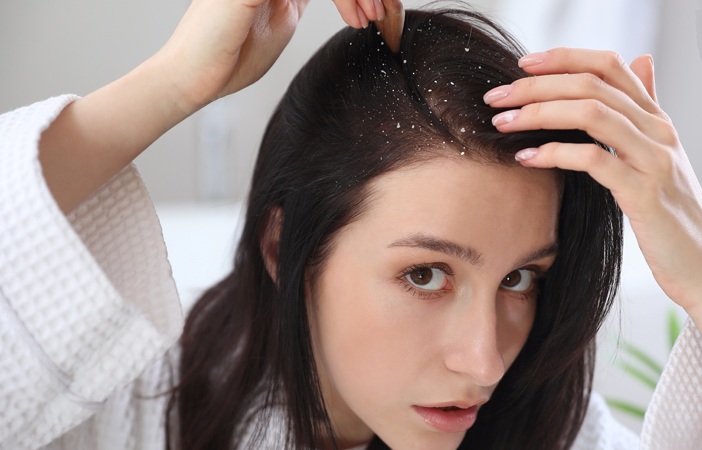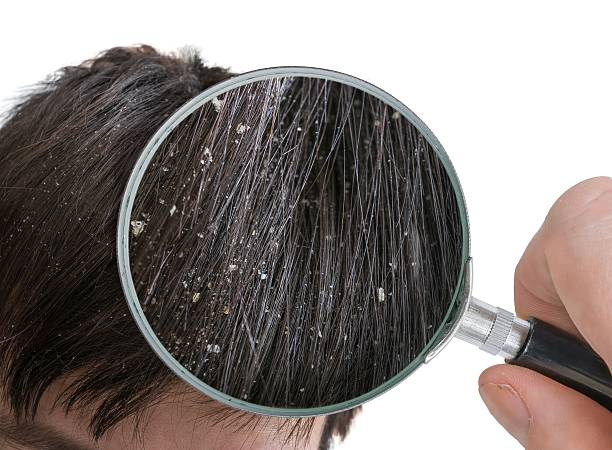How To Remove Dandruff from Hair

- What is Dandruff ?
- Why Does Dandruff Occur ?
- Causes of Dandruff ?
- Home Remedies for Dandruff ?
- Potential Benefits of Home remedies for
Dandruff ?
- Anti Dandruff Routine ?
- When to see a Dermatologist ?
v
What is dandruff?
Dandruff is a common scalp condition that affects many people. It is
characterized by flaky and itchy skin on the scalp. While it is not a serious
medical condition, it can be frustrating and embarrassing.
Why does Dandruff
Occur?
Dandruff occurs when the scalp sheds dead skin cells at an excessive rate, leading to the formation of white or yellow flakes on the scalp and hair. These flakes can fall onto clothing, causing embarrassment and discomfort.

Causes of Dandruff
The causes of dandruff can vary from person to person, but some of
the most common factors include:
1. Yeast overgrowth:
Malassezia is a type of yeast that is naturally present on the
scalp of most adults. When it grows excessively, it can cause irritation and
inflammation, leading to dandruff. This yeast feeds on the natural oils
produced by the scalp, called sebum. In some people, the body's immune response
to Malassezia can trigger an overproduction of skin cells, which leads to the
formation of dandruff flakes.
2. Dry scalp:
When the scalp becomes dry, it can become itchy and flaky, leading
to the development of dandruff. This can be caused by a variety of factors,
including cold weather, low humidity, and frequent use of hair products that
strip the scalp of its natural oils. People with naturally dry skin may also be
more prone to developing dandruff.
3. Seborrheic dermatitis:
Seborrheic dermatitis is a common skin condition that affects the
scalp, causing redness, inflammation, and flakes. It is thought to be caused by
an overgrowth of yeast on the scalp, as well as an overproduction of sebum.
This condition can also affect other areas of the body, such as the face and
chest.
4. Other factors
Other factors that can contribute to dandruff include stress, poor
hygiene, certain hair products, and a diet that is high in sugar and saturated
fats.
Each of these causes can lead to dandruff by disrupting the normal
balance of the scalp's natural oils and skin cell turnover. Understanding the
underlying cause of your dandruff can help you choose the most effective
treatment for your specific situation. Some treatments, such as medicated
shampoos or natural remedies, may be more effective for certain types of
dandruff than others.
Home Remedies for Dandruff
Dandruff can be embarrassing and
uncomfortable. While there are many over-the-counter treatments available,
natural remedies can also be effective in reducing dandruff symptoms. Below are
some of the most popular home remedies for dandruff and how to use them.
1. Tea Tree Oil
Tea tree oil is an essential oil that has natural antifungal and
antibacterial properties. It can be an effective treatment for dandruff caused
by yeast overgrowth. To use tea tree oil for dandruff, mix a few drops of tea
tree oil with carrier oil, such as coconut oil or jojoba oil. Apply the mixture
to the scalp and massage gently. Leave it on for at least 30 minutes or
overnight before washing it off with a mild shampoo. Repeat once or twice a
week.
2. Aloe Vera
Aloe vera is a natural moisturizer that can help soothe dry and itchy
scalp. It also has anti-inflammatory properties that can reduce inflammation
and irritation caused by dandruff. To use aloe vera for dandruff, apply fresh
aloe vera gel directly to the scalp and massage gently. Leave it on for at
least 30 minutes before washing it off with a mild shampoo. Repeat once or
twice a week.
3. Apple Cider Vinegar
Apple cider vinegar has natural antibacterial and antifungal
properties that can help reduce dandruff. It can also help restore the pH
balance of the scalp, which can prevent yeast overgrowth. To use apple cider
vinegar for dandruff, mix equal parts of apple cider vinegar and water. Apply the
mixture to the scalp and massage gently. Leave it on for 15-20 minutes before
washing it off with a mild shampoo. Repeat once or twice a week.
4. Coconut Oil
Coconut oil is a natural moisturizer that can help soothe dry and
itchy scalp. It also has antimicrobial properties that can help reduce yeast
overgrowth. To use coconut oil for dandruff, warm up the oil and apply it to
the scalp. Massage gently and leave it on for at least 30 minutes or overnight
before washing it off with a mild shampoo. Repeat once or twice a week.
Potential Benefits of Home Remedies for
Dandruff
Using natural remedies for dandruff can have several potential
benefits. They are generally affordable, easily available, and safe for most
people. Additionally, natural remedies do not contain harsh chemicals that can
cause further irritation to the scalp. While these remedies may not work for
everyone, they can be a good option for those who prefer natural
treatments.
Anti-Dandruff Routine
While most of us follow an elaborate
routine for our skin, we don’t quite do the same for our hair. The truth is, we
need to give our hair and scalp just as much attention if our focus is health
and strength from root to tip. While a simple oil-shampoo-condition routine
does the job of cleansing and conditioning your hair, you will need a much more
sophisticated approach if you’re dealing with a recurring condition like
dandruff
1. Treat with a scalp scrub
Why
a scalp scrub you ask? Well, just like face and body scrubs, scalp scrubs help
remove dead skin cells along with excess oil and product build-up that tends to
block hair follicles
2.
Cleanse with an anti-dandruff shampoo
Cleansing
with this anti-dandruff shampoo
allows for Malassezia to be tackled at the roots. Besides this, it also reduces
itchiness and soothes the scalp.
3.
Nourish with a dandruff-fighting conditioner
The Dandruff Conditioner combines tea tree oil and natural emollients to remove dandruff
from the hair strands and keep it soft, nourished and hydrated. This
conditioners instantly detangles, smoothens, and renews worn-out locks.
4.
Prevent dandruff from reappearing with a hard-working scalp serum
A leave on scalp serum is an effective way to provide targeted action against dandruff. Tea Tree Dandruff Fighting Scalp Serum will not only treat and prevent dandruff from recurring but will also inhibit the growth of dandruff causing Malassezia. To achieve the best results, you can use this serum daily for atleast 4 weeks.
When to See a Dermatologist?
Dandruff
can often be treated effectively with over-the-counter products and natural
remedies. However, there may be times when it's necessary to see a
dermatologist for more specialized treatment. In this section, we will discuss
when you should consider seeing a dermatologist for dandruff.
1. Severe
dandruff:
2.
Persistent itching and redness:
3. Other
symptoms: hair
loss or skin lesions
In conclusion, dandruff can be a frustrating and embarrassing
condition, but there are many ways to treat it. In this article, we have
discussed some of the most effective methods for getting rid of dandruff,
including medicated shampoos and natural remedies like tea tree oil and aloe
vera.
Remember
that everyone's scalp is different, and what works for one person may not work
for another. It may take some trial and error to find the right treatment plan
for you. But with persistence and patience, you can find relief from your
dandruff symptoms.
Courtesy : Plum Goodness

Add New Comment